
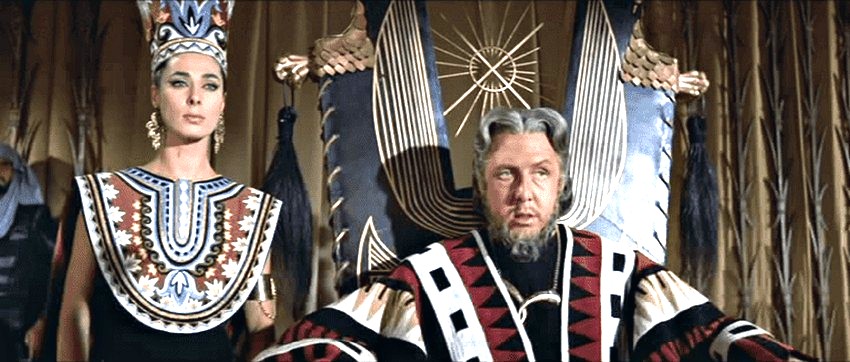
Frank Thring, the waspish Australian actor born in 1926, appeared in four Hollywood spectaculars between 1958 and 1961 before returning back to his home country. Although he then turned up in several Australian tv productions, such as Skippy the Kangaroo, and even made the occasional movie appearance – including the judge who orders the hanging of Ned Kelly in the 1970 version – Thring never hit the international headlines again. He even did TV commercials for the Australian government, the most famous being “You do have a TV licence don’t you”? Thring was briefly married to Joan Cunliffe although was openly gay and camp. He died of cancer in 1994. His father F.W. Thring is credited with having invented the clapperboard, although the claim has been contested.
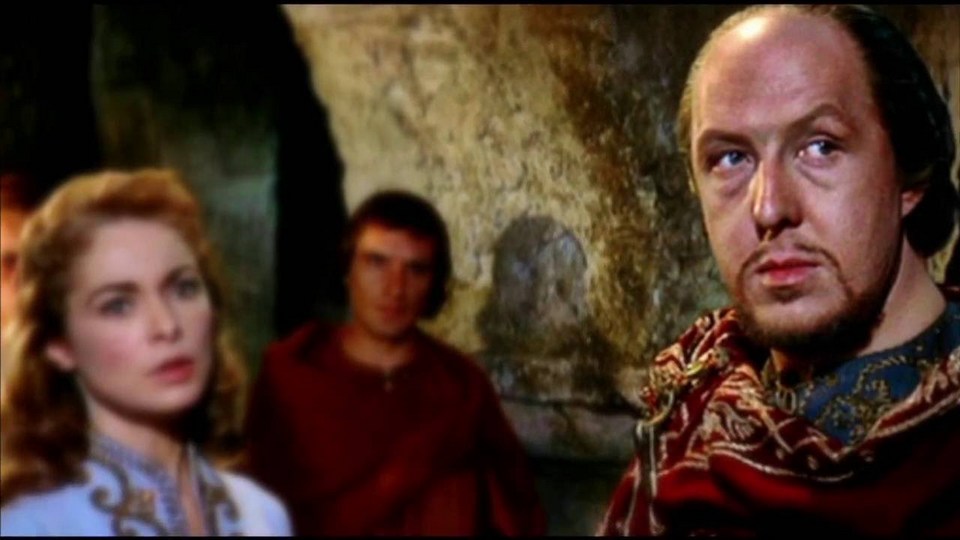
The Vikings (1958)
The swashbuckler starred Kirk Douglas and Tony Curtis who ordered that no actors should appear in the movie who appeared to be younger than they were. This explains why all the Vikings portrayed in the fight sequences and drunken orgies all look around 40 or older. The main pluses in the movie are the scenic views of Norwegian fjords and the attack on the English castle in which the entrance gate wrecked by a battering ram but then additionally requires scaling by Kirk Douglas who releases the drawbridge mechanism as the defenders unsuccessfully try to hit him with stones thrown from above. The movie is based on the book The Viking by Edison Marshal.
Thring’s role is King Aella of Northumbria who did actually exist, but a couple of centuries earlier than shown in the Hollywood production. Here he is a usurper without any sound claim to the throne who is keen to marry the Welsh princess Morgana, played by Janet Leigh, who hopefully can provide an heir to the throne. Film historians have pointed out that this is the only movie ever to show a king of Wales, Rhodri, who is Morgana’s father. However, the Vikings capture and burn the galley on which Morgana is sailing to marry Aella. The rescued maiden dreaded the idea of marrying Aella and is taken back to Scandinavia to be held as ransom.
Frank Thring’s role is not a major one, although he is central to the plot. He does succeed in executing one top Viking, Ragnar, by forcing him into a pit housing dogs half-starved and trained to appreciate the flavor of human blood. However, later in the movie, Aella is pushed into the same pit by Kirk Douglas as the castle falls to the Viking warriors. The castle used in the movie was Fort La Latte in Brittany. Nobody noticed or cared that its round towers were built centuries later than the ninth century events described in the movie.
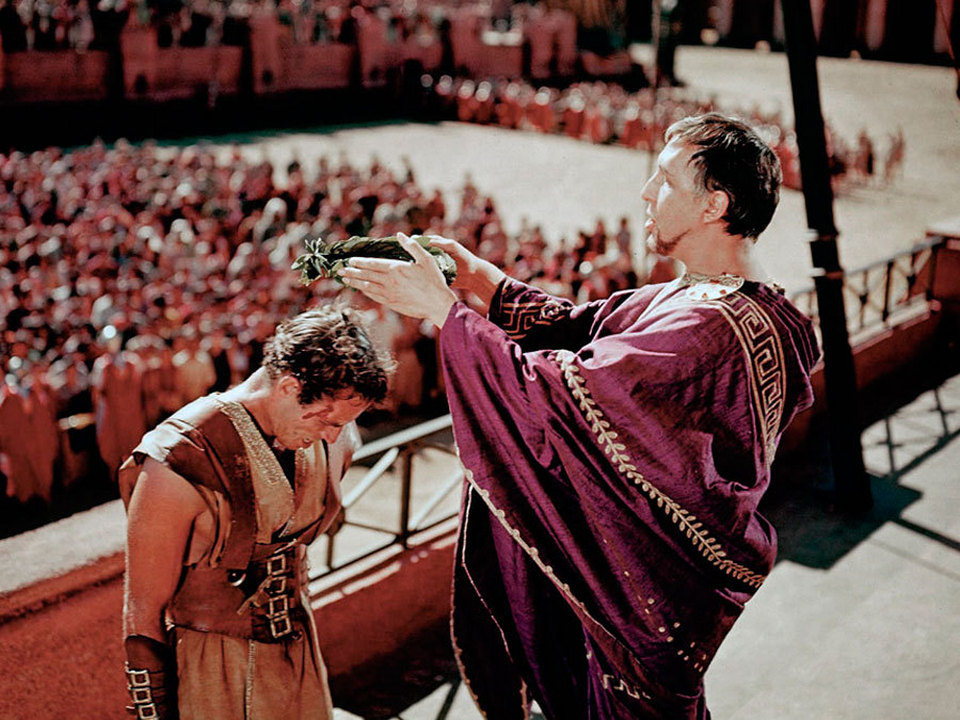
Ben Hur (1959)
Kirk Douglas was impressed by Thring’s acting abilities and recommended him for the part of Pontius Pilate in Ben Hur (a story of the Christ) starring Charlton Heston. Thring is first shown in Rome dreading the thought that he has just been promoted by the emperor Tiberius to be governor of the rebellious province of Judaea. “It seems that the prophets and scorpions can’t get on without me and there you have it.” It then becomes his duty to open the chariot games in the new province which he does with a flourish.
Afterwards he meets Charlton Heston and advises him to return to Rome where he will be welcomed. Pilate knows that Heston is a Jew whose mother and daughter have been locked up for treasonable practices after an earlier attempt on the life of a previous Roman governor. The suspicion is that if Heston remains in Judaea, he will stir up trouble for the Romans and be a security threat. And so it turns out. Thring as Pilate has the unenviable job of assessing the guilt of Jesus and, of course, washes his hands of the blood of an innocent man. This was Thring’s only Hollywood role where he is not an out-and-out villain.
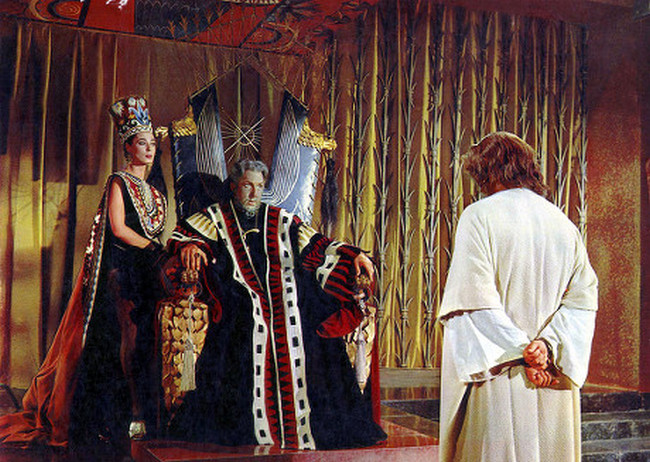
King of Kings (1961)
An attempt to recreate the cash cow of Ben Hur, King of Kings has Thring as Herod Antipas, the puppet ruler of Judaea on behalf of Rome who murders his own father to take the throne. Much of the movie revolves round the relationship between John the Baptist and Herod. On the one hand, the king knows that John is a revolutionary who hates Rome. But on the other Herod is fascinated by John’s teachings.
Herod eventually orders the beheading of John at the behest of his step daughter Salome in whom he (Herod) has an unhealthy sexual interest. The climax of the movie shows Herod trying Jesus and unsuccessfully attempting to get him to perform magic by creating thunder or changing a clay pot into gold. Frank Thring was the only actor ever to play both roles of accuser of Jesus: Pontius Pilate in Ben Hur and Herod Antipas in King of Kings. That was Thring’s unique contribution to biblical history in Hollywood productions.
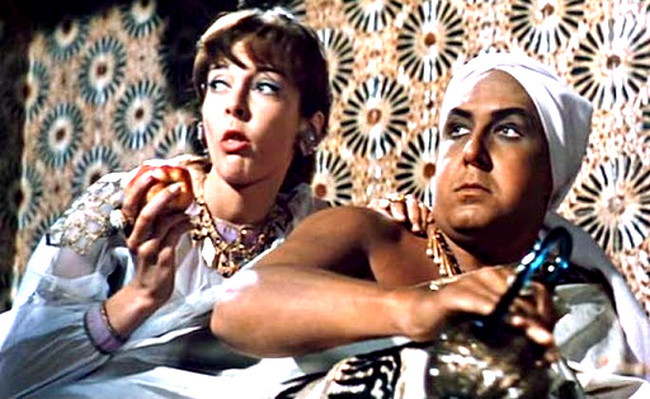
El Cid (1961)
Thring’s final appearance in a Hollywood historical movie was as Al Kadir, the emir of Valencia in the spectacular El Cid. His role is minor and his job is to prevent the Christians from capturing the strategically-important city in the civil war of the period. Needless to say he fails in his endeavor. After El Cid besieges the city for several months, he orders bread to be catapulted into the starving city where the grateful citizens open the gates and welcome their former enemy.
Thring is deserted by his troops and utters a scream as the worthy citizens hurl him to his death. Al Kadir has very little to say in this film and his total lines amount to only about 100 words. Thring seems to have realized that he had passed the peak of his Hollywood career and departed soon afterwards to Australia. On Australian TV many years later, he stated that Pontius Pilate was his only significant role and movie commentators agree. It has been said that Thring’s main acting interest was to play Shakespearian roles, which he did in his pre-Hollywood youth. He never really found his inspiration in anything else.
 |
 |
 |





